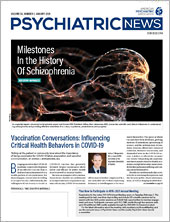AvKARE Recalls Sildenafil, Trazodone
Last December AvKARE recalled one lot of sildenafil 100 mg tablets and one lot of trazodone 100 mg tablets because of a product mix-up in which the two medications were inadvertently packaged together during bottling at a third-party facility. (Sildenafil is the active ingredient in Viagra.) The affected lots of sildenafil 100 mg tablet (Lot 36884 with an expiration date of 03/2022) and trazodone hydrochloride 100 mg Tablet (Lot 36783 with an expiration date of 06/2022) were distributed nationwide.
A company statement shared on the U.S. Food and Drug Administration (FDA) website noted that unintentional consumption of sildenafil may pose serious health risks to patients who have underlying medical issues. For example, sildenafil may interact with nitrates found in prescription drugs such as nitroglycerin and cause dangerously low blood pressure.
Phase 3 Trial Begins For Adjunctive Treatment For MDD
Relmada Therapeutics has begun a phase 3 trial of REL-1017, a novel N-methyl-D-aspartate receptor channel blocker, as an adjunctive treatment for major depressive disorder, the company announced last December.
The trial will consist of two two-arm, placebo-controlled clinical trials and include approximately 400 patients with major depressive disorder whose current antidepressants are inadequate. Patients will add either a 25 mg oral dose of REL-1017 once per day or placebo to their ongoing antidepressant treatment. The primary endpoint will be the change from baseline on the Montgomery Åsberg Depression Rating Scale score at day 28 in patients who take REL-1017 compared with those who take placebo.
In a phase 2 trial, patients who took REL-1017 experienced a statistically significant improvement in their depression compared with those who took placebo. In April 2017, the FDA granted fast track designation for REL-1017 for the adjunctive treatment of major depressive disorder. (The FDA fast track is a process designed to facilitate the development and expedite the review of drugs that treat serious conditions and fill an unmet medical need.)
Tasimelteon Approved for Sleep in Smith-Magenis Syndrome
In December the FDA approved tasimelteon (Hetlioz) capsule and liquid formulations for the treatment of sleep disturbances in adults and children who have Smith-Magenis Syndrome (SMS), a rare neurodevelopmental disorder in which a defining feature is an inverted circadian rhythm that makes it difficult for patients to sleep at night. Tasimelteon, by Vanda Pharmaceuticals Inc., is currently approved for the treatment of non-24-hour sleep-wake disorder (“non-24”), a chronic disorder that disrupts circadian rhythms and affects up to 70% of people who are totally blind.
In a nine-week double-blind, placebo-controlled, crossover study of patients aged 3 years and older with SMS, tasimelteon was associated with a statistically significant improvement in sleep. The study included two 4-week periods, separated by a 1-week washout period. Patients aged 3 to 15 years received a weight-based dose of liquid tasimelteon and patients aged 16 years and older received 20 mg capsules once a day. Patients or their guardians recorded the patients’ total nighttime sleep and sleep quality. Tasimelteon’s effectiveness was determined based on the 50% of nights with the worst sleep quality and the 50% of nights with the least nighttime sleep in each 4-week period.
When patients took tasimelteon, they experienced a statistically significant improvement in the 50% worst nights’ sleep quality compared with when they took placebo.
Asenapine Patch Now Available for Schizophrenia
Asenapine transdermal (Secuado) is now available for the treatment of schizophrenia in adults, Noven Pharmaceuticals Inc. announced in December. The FDA approved asenapine transdermal in October 2019.
In a phase 3 study, 616 adults who were experiencing an acute exacerbation of schizophrenia were randomized to asenapine transdermal 7.6 mg/24h or 3.8 mg/24h or placebo. At six weeks, those who used the asenapine patch had significant improvement in their Positive and Negative Syndrome Scale (PANSS) total score compared with those who used a placebo patch. Patients who used the asenapine patch also experienced statistically significant improvement in Clinical Global Impression-Severity scores compared with those who used a placebo patch. ■
